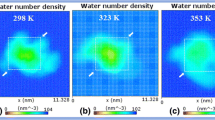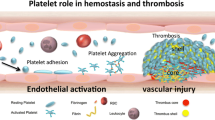Abstract
THERE is very little experimental evidence concerning the site or mechanism of cellular injury during the cooling, freezing and re warming of living cells. Membranes of erythrocytes1 and of mitochondria2 have been suggested as cellular regions which are injured during freezing and thawing by increased salt concentrations. During investigations of freeze-thaw induced structural alterations of Littré ascites tumour cells, I decided to use heparin to minimize the coagulation of cell suspensions which frequently occurred soon after these cells were gathered from host mice. This use of heparin resulted in a dramatic fading of nuclei when the ascites cells were subjected to freezing and thawing. The purpose of this brief communication is to describe this action of heparin and to propose a tentative explanation of the phenomenon which provides evidence that the cell membrane is a site of freeze-thaw injury.
Similar content being viewed by others
References
Lovelock, J. E., Proc. Roy. Soc. B, 147, 427 (1957).
Sherman, J. K., Anat. Rec., 149, 172 (1964).
Shrek, R., Amer. J. Cancer, 28, 389 (1936).
Author information
Authors and Affiliations
Rights and permissions
About this article
Cite this article
SHERMAN, J. Unusual Action of Heparin on Ascites Tumour Cells during Freezing and Thawing. Nature 204, 100–101 (1964). https://doi.org/10.1038/204100a0
Issue Date:
DOI: https://doi.org/10.1038/204100a0
- Springer Nature Limited





